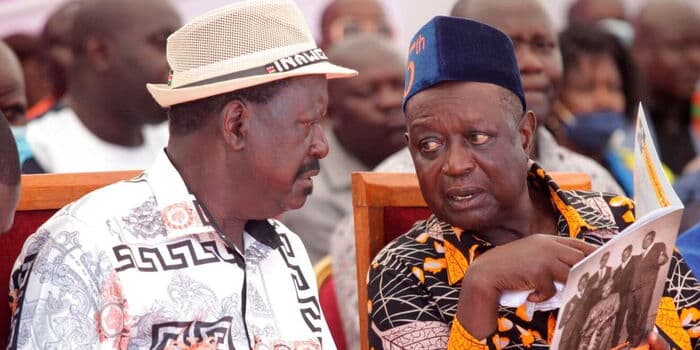We're loading the full news article for you. This includes the article content, images, author information, and related articles.
In his most detailed account yet, Senator Oburu Odinga reveals former Prime Minister Raila Odinga battled a brain clot and that President Ruto personally intervened to arrange his evacuation to India, days before his unexpected death.

NAIROBI, KENYA – Siaya Senator Oburu Odinga has revealed the full extent of the medical crisis that preceded the death of his brother, former Prime Minister Raila Odinga, providing Kenyans with a poignant account of his final weeks. In a televised interview on Sunday, November 2, 2025, Oburu disclosed that Raila was being treated for a blood clot in his brain and that President William Ruto played a direct role in his emergency medical evacuation to India.
The former Prime Minister passed away on Wednesday, October 15, 2025, from what was reported as a cardiac arrest while recuperating in Kerala, India. His death sent a wave of shock across the nation, leaving a significant vacuum in Kenya’s political landscape.
According to Oburu, the health challenges began when doctors in Nairobi discovered a blood clot in Raila’s head. “It was some clot that was discovered on his head, and it was being dissolved by our doctors here in Nairobi,” Oburu stated on Sunday. He explained that the treatment was taxing, saying, “The medication was strong, and it left him weak and tired. That's why he could not attend some public events.”
The situation grew complicated when conflicting medical opinions arose between specialists in Kenya and Dubai regarding the best course of treatment. This disagreement prompted a crucial intervention from the highest office in the country.
In a remarkable moment of unity that transcended years of political rivalry, President William Ruto personally stepped in. Oburu recounted that the President, upon returning from the United Nations General Assembly, visited Raila at his Karen home to assess the situation directly. “The President took that matter seriously and organised for his evacuation to India,” Oburu said, expressing deep gratitude. “His quick reaction made everything possible.”
In India, doctors in Mumbai successfully cleared the clot. “By the time he left the hospital, he was up and about, alive and kicking,” Oburu explained. Following the procedure, Raila was moved to the Sreedhareeyam Ayurvedic facility in Kerala to recuperate—the same facility where his daughter Rosemary had previously received treatment. He was scheduled to return to Kenya just days after his eventual passing.
The core of Oburu’s emotional account was his final phone call with his brother on the night of Tuesday, October 14, 2025, just hours before he died. He pushed back against online speculation that the family had hidden the severity of Raila’s condition. “As I informed you earlier, he was well and kicking about and would soon be back in the country. That was not a lie; it was the truth,” Oburu insisted.
“He was very well until last night. I spoke to him; he was vibrant, up and kicking,” Oburu recounted. The news the following morning came as a profound shock to the family and the nation. “It is only unfortunate that this morning, he suffered a shock which, after post-mortem, is suspected to have been a heart attack.”
Raila Odinga, a dominant figure in Kenyan politics for decades, was 80 years old. He served as Prime Minister from 2008 to 2013 and made five unsuccessful presidential bids. Following his death, President Ruto declared a seven-day period of national mourning, with tributes pouring in from leaders across Africa and the world, including former President Uhuru Kenyatta, Tanzanian President Samia Suluhu Hassan, and Indian Prime Minister Narendra Modi.
On Thursday, October 16, 2025, Oburu led the family in the Luo traditional rite known as ‘tero ywak pacho’ (taking the cry home) at their ancestral home in Bondo, formally opening the homestead for communal mourning. Oburu’s latest revelations provide a fuller picture of the private health struggle of a public titan, offering closure and a testament to the unexpected bridges built during a time of crisis.
Keep the conversation in one place—threads here stay linked to the story and in the forums.
Sign in to start a discussion
Start a conversation about this story and keep it linked here.
Other hot threads
E-sports and Gaming Community in Kenya
Active 9 months ago
The Role of Technology in Modern Agriculture (AgriTech)
Active 9 months ago
Popular Recreational Activities Across Counties
Active 9 months ago
Investing in Youth Sports Development Programs
Active 9 months ago
Key figures and persons of interest featured in this article